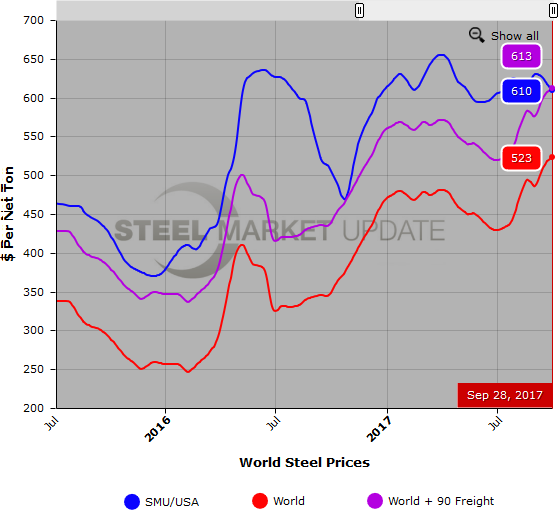Overseas

September 28, 2017
Foreign vs. Domestic Hot Rolled Price Comparison in September
Written by Brett Linton
The following calculation is used by Steel Market Update to identify the theoretical spread between foreign hot rolled steel import prices (delivered to USA ports) and domestic (USA) hot rolled coil prices (FOB Domestic mills). We want our readers to be aware that this is only a “theoretical” calculation as freight costs, trader margin and other costs can fluctuate, ultimately influencing the true market spread.
Our primary numbers for this analysis are from Platts as we compare European HRC export pricing (FOB Ruhr), Turkey HRC export pricing (FOB Turkey) and Chinese HRC export pricing (FOB Chinese port). Be aware that Chinese hot rolled pricing is not available to the U.S. market, so the Chinese spread is nothing more than an exercise in “what if.” SteelBenchmarker is the secondary data provider of foreign hot rolled coil prices and is noted further down in this article.
![]() SMU adds $90 per ton to these foreign prices taking into consideration freight costs, handling, trader margin, etc. This provides an approximate “CIF U.S. ports price” that can then be compared against the SMU U.S. hot rolled price average (FOB Mill), with the result being the spread (difference) between domestic and foreign hot rolled prices. As the price spread narrows, the competitiveness of imported steel into the United States is reduced. If the spread widens, then foreign steel becomes more attractive to U.S. flat rolled steel buyers. A positive spread means U.S. prices are theoretically higher than foreign prices, while a negative spread means U.S. prices are cheaper than foreign prices.
SMU adds $90 per ton to these foreign prices taking into consideration freight costs, handling, trader margin, etc. This provides an approximate “CIF U.S. ports price” that can then be compared against the SMU U.S. hot rolled price average (FOB Mill), with the result being the spread (difference) between domestic and foreign hot rolled prices. As the price spread narrows, the competitiveness of imported steel into the United States is reduced. If the spread widens, then foreign steel becomes more attractive to U.S. flat rolled steel buyers. A positive spread means U.S. prices are theoretically higher than foreign prices, while a negative spread means U.S. prices are cheaper than foreign prices.
As of today (Thursday, Sept. 28), Platts published European HRC prices at $579 per net ton FOB Ruhr ($541 euros per metric ton), up $17 per ton from two weeks ago and up $6 from late August. Adding in $90 per ton for import costs, that puts the price at $669 per net ton from Europe delivered to the U.S. The latest Steel Market Update hot rolled price average is $610 per ton for domestic steel, down $15 per ton from two weeks ago, and down $20 per ton over our late-August price. This puts the theoretical spread between European and U.S. HR prices at -$59 per ton, down from a -$27 spread two weeks ago, and down from a -$33 spread one month ago. This means that U.S.-sourced HR is theoretically now $59 per ton cheaper than getting HR steel imported from Europe.
Chinese HRC prices were reported by Platts as being $499 per net ton ($550 per metric ton), down $41 from two weeks ago, but up $1 from one month ago. Adding $90 in estimated import costs puts Chinese HRC prices at $589 per ton delivered (if Chinese mills were able to ship to the United States, which they are not). The theoretical spread between the Chinese and U.S. HR price is +$21 per ton, up from -$5 per ton two weeks ago, but down from +$42 per ton one month ago. Meaning that if Chinese mills were able to ship HR to the U.S., it would be approximately $21 per ton cheaper than buying steel produced domestically.
Platts published Turkish export prices at $553 per net ton FOB Turkish port ($610 per metric ton), up $4 from two weeks ago and up $54 from one month ago. Adding $90 in import costs, the Turkish HRC “to the U.S. ports” price is $643 per ton. This puts the theoretical spread between the Turkish and U.S. HR price at -$33 per ton, down from -$14 two weeks ago, and down from +$41 one month ago. This means that HR from the U.S. is theoretically now $33 per ton cheaper than importing it from Turkey.
SteelBenchmarker World Export Price
The SteelBenchmarker world export price for hot rolled bands is $523 per net ton ($577 per metric ton) FOB the port of export, according to data released by SteelBenchmarker on Monday, Sept. 25. This is up $14 from the previous release on Sept. 11, and up $37 from one month ago. Adding in $90 in estimated import costs, that puts prices around $613 per ton delivered to the U.S. As previously mentioned, the latest Steel Market Update hot rolled price average is $610 per ton.
Therefore, the theoretical spread between the SteelBenchmarker world HR export price and the SMU HR price is -$3 per ton, meaning foreign HRC imported into the U.S. is theoretically now $3 per ton more expensive than steel purchased domestically. This spread is down from +$26 in mid-September, and down from +$54 one month ago.
This -$3 spread is around $50-60 lower than the average spread we have seen over the last few months. This is now the lowest price spread we have seen in 2017, surpassing the previous low we saw two weeks ago. This time last year, the spread was +$74 per ton, and was just coming down from the record high in our seven-year recorded history, +$210 on June 27, 2017. Prior to 2016, the previous record high was a spread of +$94 in May 2014. The lowest spread in our history was -$70 in August 2011 (meaning domestic steel was theoretically $70 per ton cheaper than foreign steel). The average spread for 2017 YTD continues to move lower; it is now +$62 per ton.
We want to again remind our readers that the calculations shown above are “theoretical,” but in most markets are probably a good indicator of where you can expect to find offers being made.
Freight is an important part of the final determination on whether to import foreign steel or buy from a domestic mill supplier. Domestic prices are referenced as FOB the producing mill, while foreign prices are FOB the Port (Houston, NOLA, Savannah, Los Angeles, Camden, etc.). Inland freight, from either a domestic mill or from the port, can dramatically impact the competitiveness of both domestic and foreign steel.
Below is a graph comparing SteelBenchmarker world HR export prices against the SMU domestic HR average price (we will build new data using Platts and replace the SteelBenchmarker data shortly). We also have included a comparison with freight and traders’ costs added, which gives you a better indication of the true price spread. You will need to view the graph on our website to use its interactive features; you can do so by clicking here. If you need assistance with either logging in or navigating the website, please contact us at 800-432-3475 or info@SteelMarketUpdate.com.







